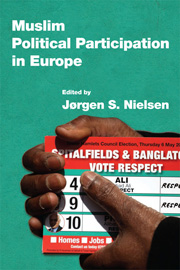Book contents
- Frontmatter
- Contents
- List of tables and figures
- 1 Introduction
- Part One Laying foundations: national and local elections
- Part Two Participation as integration
- Part Three Institutions as gateways
- Part Four Breaking the bounds
- 15 Muslims and electoral politics in Britain: the case of the Respect Party
- 16 Clichés are funny as long as they happen on stage: comedy as political criticism
- Notes on the contributors
- Index
16 - Clichés are funny as long as they happen on stage: comedy as political criticism
from Part Four - Breaking the bounds
Published online by Cambridge University Press: 05 October 2013
- Frontmatter
- Contents
- List of tables and figures
- 1 Introduction
- Part One Laying foundations: national and local elections
- Part Two Participation as integration
- Part Three Institutions as gateways
- Part Four Breaking the bounds
- 15 Muslims and electoral politics in Britain: the case of the Respect Party
- 16 Clichés are funny as long as they happen on stage: comedy as political criticism
- Notes on the contributors
- Index
Summary
Introduction
The topic of the evening: Elections are just around the corner. Federal elections in Fatihland! What will happen? Recently politics has recognized foreigners as a voting bloc. But now the question is – we are enlightened democrats here – the question is therefore: ‘What do we Germans actually know about us Turks?’ Tell me! Tell me! [applause].
(Çevikkollu 2009)This opening sequence of a stand-up performance by Fatih Çevikkollu, a German actor and comedian born to Turkish parents in Cologne, introduces a contestation of ethnic stereotypes in everyday life. Çevikkollu is committed to the German tradition of political cabaret and frequently appears in established TV shows. His performance Moslem TÜV, which he published as a book and took to comedy stages around Germany, criticises a citizenship test from 2006 aimed at scrutinising Muslim applicants' values. Besides, Çevikkollu supports campaigns for participation in elections like the one by the German Federal Agency for Civic Education for the federal elections in 2009. The political content of his shows, as well as his personal engagement for political participation, distinguish Çevikkollu as an entertainer with both political awareness and a voice.
Stand-up comedy and other creative political interventions of Muslims or individuals of Muslim background have largely been neglected within research on political participation in this field. Most surveys on political participation concentrate on active and passive elective participation, the measurement of trust in legal and political institutions, adherence to liberal-democratic values, degrees of organisation, and protest movements.
- Type
- Chapter
- Information
- Muslim Political Participation in Europe , pp. 322 - 338Publisher: Edinburgh University PressPrint publication year: 2013



